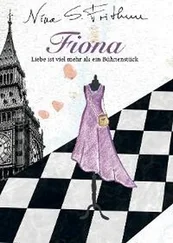Meanwhile, Vicki was reapplying lip liner and Bare Escentuals foundation, which she had bought with the gift certificate he had given her. She was adamant he understand this was his gift, and began to tout the boons of mineral makeup and how well it looked on-screen.
He cleared his throat and said, “Vicki, you are not getting on TV, and you don’t belong here, so get out.”
She looked at him through the mirror. He had demoted TCs for less, and she knew it. He sat on the chair from which he would be making his demands, and stood her between his legs. He said, “Okay, Vick, tell me something: how did you even know we were filming today?”
She swiveled between his thighs. “Everyone knows.”
“I see. And what is it you hope to accomplish by imposing yourself on proceedings that do not concern you?”
“Exposure.” And then, because she had rehearsed this part, “So that everyone can see we’re happy and that our way is good.”
He didn’t want to demote Vicki, but she was not leaving him much choice. She doffed her newsboy cap, which was black leather, and smiled, so that whatever was in her mouth reflected light from the overhead. It took him a second to register that it was not a filling or a crown and that she’d been slurring a little, lisping a little, because there were ears in her teeth. A little mic. That traitor.
He sprang off the chair and backed away. Reached for the blanket Dean had folded on a shelf—“Think fireside chat,” he’d said — and threw it over his head.
“Spit it out!” he said, and he thrust his hand from under the blanket.
“What?” she said. “Spit what out?”
“Do it, Vicki. Hand it over.”
“The jelly? You’re mad because of the jelly? They were in the kitchen; I thought they were for everyone!”
“Get out, get out, GET OUT!” he said, and he used his wingspan — helped by the blanket — to corral her out the door, which he then barricaded with the desk. And the chair. And a five-gallon bottle of water he had to roll across the room on its side. Two five-gallon bottles. Three.
He was exhausted. But his labors were rewarded because neither Vicki nor Charlotte, nor both together, could force the door. He heard fists on the wood and a few body slams and then Vicki say, “This is some bullshit,” and Charlotte say, “I left home for this?” though what was noticeable in their remarks was not an upswell of disillusion but the torpor with which it was expressed.
The blanket had fallen to the floor. In lieu of parquet, they had dusted the concrete with wood shavings, which cleaved to the wool. Never mind. Thurlow just wanted to sit and regroup. He took note of the hostages, who had watched the foregoing play out in silence.
These people had names. Their lives were sui generis.
Outside, it had started to snow, maybe to hail. The feds had just cut electricity to the house. It took a minute for the generator to kick on, and in this minute, Thurlow heard ice pelt the roof. Also a voice, one of the hostages, saying, “Mr. Dan? We’re sorry to bother you, but is there any chance we can talk this over?”
He buzzed for Norman, and when he got Norman’s voicemail — where was everyone? — he told him to reinstate the hoods and find a few dishrags, bandannas, whatever, because apparently the hostages had things they wanted to say. Also, he was afraid to leave the commissary without escort. Then again, he hated to be there with them. How bad was it when your only companionship was the four people you’d kidnapped? Bride of Frankenstein came to mind.
He left the commissary through a back door. Slipped through a walk-in closet and into a guest room with a trundle bed and tinted glass doors that overlooked a lawn tombed in snow. Dust congested in the monocle of a surveillance lens overhead. He swiped it with a Kleenex. Cleared his throat. Sat on the carpet, looked at the camera, and emptied his face of anything that was not love.
“Hi, little one,” he said. “My little Ida. I guess it’s time I should be addressing myself to no one else but you. So here is what I expect: Mistakes will be made. In the ferreting out of Helix staff, the wrong people will get hurt. Whoever is out there will scan the house for heat signatures and kill one another in the process. There will be hearings in D.C. and a passing of the buck, and I won’t make it, and you’ll never know.”
It was probably five degrees outside. But with his dreams hanging off him like dead leaves and the winter of his unhappiness so cold it inured the body to minor pain but did nothing for the big stuff, he opened a window. And let the freeze rush in.

THE SUN HAD BEEN UP FOR TWENTY MINUTES; the phone had been ringing nonstop. Esme was in the greenhouse: Jim Bach was calling. This early, he might be calling as her lover, DoD liaison, or both. She considered answering, considered not.
It had been many hours since her team last checked in from the Helix House. Too many for anyone to think all was well. She had their dossiers open on the table.
“What?” she said and yawned into the line.
“Crap,” he said. “I gotta take this call. Hold on. Don’t hang up. ”
Her daughter’s voice through the intercom—“Mohhhhhhhhm!”—shrill and urgent, stout with need. Where are you, Mom? Are you here for me, Mom? What about tomorrow and the day after that? Ida was asking for the peanut butter. The kitchen staff had offered up a smooth and creamy variety that irked her preference for texture, and she was wondering why Esme had not come through for her in the execution of this simple task, the acquisition of a peanut spread to her liking, though what she was really asking was, Why didn’t her mom know her? Esme addressed the intercom—“Check the cupboard above the fridge”—because, while it was true she didn’t know what Ida liked, she did know there was hope in variety. One of Ida’s classmates had seventy-two sweatshirts, and where once Esme looked down on parents who plied their kids with stuff, now she understood: if these parents knew their daughter’s favorite color and bias for hoodies with a pink — not purple! — velvet band across the front — not the back! — they would have bought her just one sweatshirt, the most perfect one on earth. So maybe she had a more nuanced take on what it meant to be rich and buy your child’s love.
“Natural?” Ida said. “Where’s the natural kind?”
She would show up at the greenhouse in two minutes, which meant Esme had two minutes to put on her mom face. She hated to think it, but some part of her envied the stork. This bearer of child who got to skip town after. She had never asked for motherhood or the captivity of its dogma: no matter what, you will always be a mother. Your child dies, hates you, runs off — you are still a mother, stuck with this name, and hugged for life to the amazing little ID sprung from your own.
Jim back on the line. “You still there?” Esme was looking at the plants, how they soldiered on.
“I’m here,” she said. “It’s early.”
She was about to finger the aspidistra but thought again. She had a killer’s touch; this was not the time.
“Damn right it’s early,” Jim said. “So imagine me a couple hours ago getting a phone call. That early, I’m thinking it’s you from downstairs in nothing but a teddy. Maybe Price Waterhouse calling with the good news. But no, it’s the lovely and charming Erin Bach. Screaming. Any idea why my wife would be screaming at me at 6 a.m.?”
“Maybe because you’re having an affair,” she said, and she opened Olgo’s file.
“Cute. Any other guesses? No? Then maybe I should enlighten you. At 6 a.m., my wife calls me up to say her dad’s gone to Cincinnati on some strange work assignment that she thinks has something to do with the Helix, and what do I know about it? She says he hates the Helix, and what kind of monster am I to send him there?”
Читать дальше













